Jean-Guy Mailly
Graph Convolutional Networks and Graph Attention Networks for Approximating Arguments Acceptability -- Technical Report
Apr 29, 2024



Abstract:Various approaches have been proposed for providing efficient computational approaches for abstract argumentation. Among them, neural networks have permitted to solve various decision problems, notably related to arguments (credulous or skeptical) acceptability. In this work, we push further this study in various ways. First, relying on the state-of-the-art approach AFGCN, we show how we can improve the performances of the Graph Convolutional Networks (GCNs) regarding both runtime and accuracy. Then, we show that it is possible to improve even more the efficiency of the approach by modifying the architecture of the network, using Graph Attention Networks (GATs) instead.
Admissibility in Strength-based Argumentation: Complexity and Algorithms (Extended Version with Proofs)
Jul 05, 2022
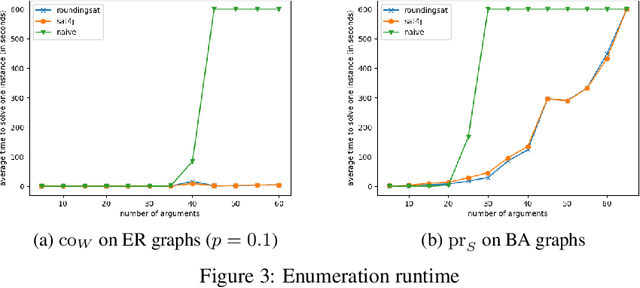


Abstract:Recently, Strength-based Argumentation Frameworks (StrAFs) have been proposed to model situations where some quantitative strength is associated with arguments. In this setting, the notion of accrual corresponds to sets of arguments that collectively attack an argument. Some semantics have already been defined, which are sensitive to the existence of accruals that collectively defeat their target, while their individual elements cannot. However, until now, only the surface of this framework and semantics have been studied. Indeed, the existing literature focuses on the adaptation of the stable semantics to StrAFs. In this paper, we push forward the study and investigate the adaptation of admissibility-based semantics. Especially, we show that the strong admissibility defined in the literature does not satisfy a desirable property, namely Dung's fundamental lemma. We therefore propose an alternative definition that induces semantics that behave as expected. We then study computational issues for these new semantics, in particular we show that complexity of reasoning is similar to the complexity of the corresponding decision problems for standard argumentation frameworks in almost all cases. We then propose a translation in pseudo-Boolean constraints for computing (strong and weak) extensions. We conclude with an experimental evaluation of our approach which shows in particular that it scales up well for solving the problem of providing one extension as well as enumerating them all.
Design and Results of ICCMA 2021
Oct 06, 2021
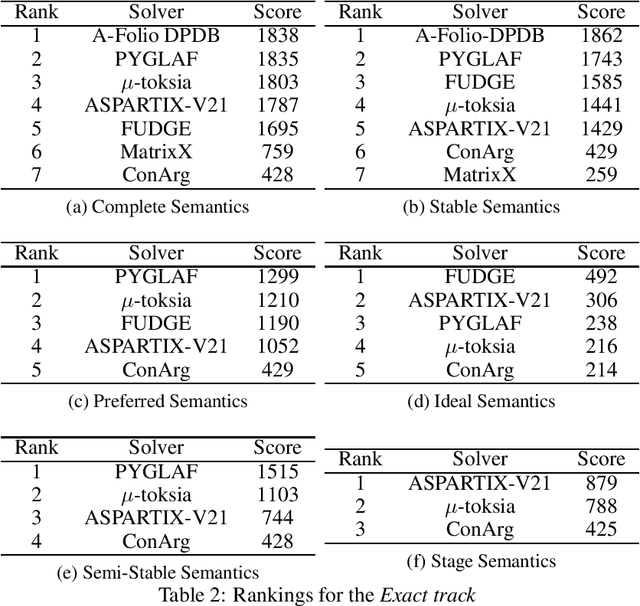
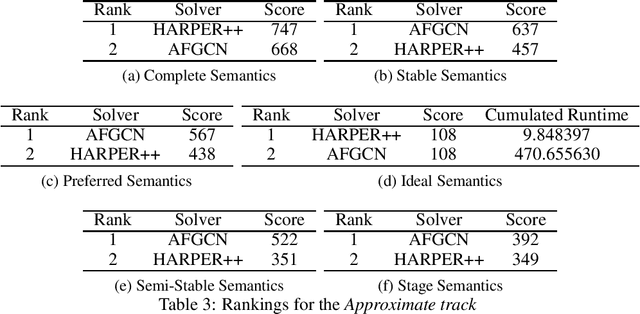
Abstract:Since 2015, the International Competition on Computational Models of Argumentation (ICCMA) provides a systematic comparison of the different algorithms for solving some classical reasoning problems in the domain of abstract argumentation. This paper discusses the design of the Fourth International Competition on Computational Models of Argumentation. We describe the rules of the competition and the benchmark selection method that we used. After a brief presentation of the competitors, we give an overview of the results.
Stability in Abstract Argumentation
Dec 23, 2020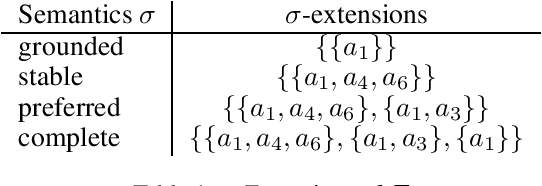
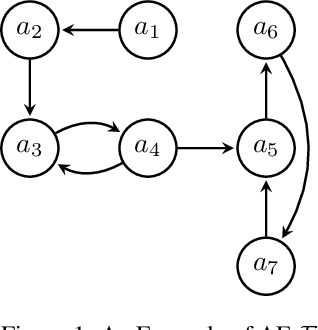
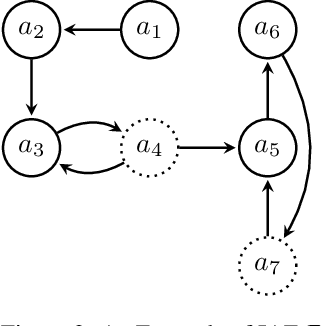
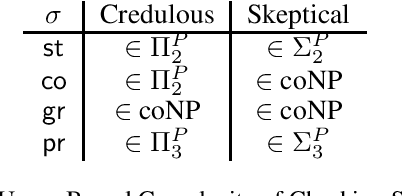
Abstract:The notion of stability in a structured argumentation setup characterizes situations where the acceptance status associated with a given literal will not be impacted by any future evolution of this setup. In this paper, we abstract away from the logical structure of arguments, and we transpose this notion of stability to the context of Dungean argumentation frameworks. In particular, we show how this problem can be translated into reasoning with Argument-Incomplete AFs. Then we provide preliminary complexity results for stability under four prominent semantics, in the case of both credulous and skeptical reasoning. Finally, we illustrate to what extent this notion can be useful with an application to argument-based negotiation.
A Note on Rich Incomplete Argumentation Frameworks
Oct 01, 2020



Abstract:Recently, qualitative uncertainty in abstract argumentation has received much attention. The first works on this topic introduced uncertainty about the presence of attacks, then about the presence of arguments, and finally combined both kinds of uncertainty. This results in the Incomplete Argumentation Framework (IAFs). But another kind of uncertainty was introduced in the context of Control Argumentation Frameworks (CAFs): it consists in a conflict relation with uncertain orientation, i.e. we are sure that there is an attack between two arguments, but the actual direction of the attack is unknown. Here, we formally define Rich IAFs, that combine the three different kinds of uncertainty that were previously introduced in IAFs and CAFs. We show that this new model, although strictly more expressive than IAFs, does not suffer from a blow up of computational complexity. Also, the existing computational approach based on SAT can be easily adapted to the new framework.
Possible Controllability of Control Argumentation Frameworks -- Extended Version
Sep 10, 2020



Abstract:The recent Control Argumentation Framework (CAF) is a generalization of Dung's Argumentation Framework which handles argumentation dynamics under uncertainty; especially it can be used to model the behavior of an agent which can anticipate future changes in the environment. Here we provide new insights on this model by defining the notion of possible controllability of a CAF. We study the complexity of this new form of reasoning for the four classical semantics, and we provide a logical encoding for reasoning with this framework.
Distributing Knowledge into Simple Bases
Mar 31, 2016
Abstract:Understanding the behavior of belief change operators for fragments of classical logic has received increasing interest over the last years. Results in this direction are mainly concerned with adapting representation theorems. However, fragment-driven belief change also leads to novel research questions. In this paper we propose the concept of belief distribution, which can be understood as the reverse task of merging. More specifically, we are interested in the following question: given an arbitrary knowledge base $K$ and some merging operator $\Delta$, can we find a profile $E$ and a constraint $\mu$, both from a given fragment of classical logic, such that $\Delta_\mu(E)$ yields a result equivalent to $K$? In other words, we are interested in seeing if $K$ can be distributed into knowledge bases of simpler structure, such that the task of merging allows for a reconstruction of the original knowledge. Our initial results show that merging based on drastic distance allows for an easy distribution of knowledge, while the power of distribution for operators based on Hamming distance relies heavily on the fragment of choice.
Using Enthymemes to Fill the Gap between Logical Argumentation and Revision of Abstract Argumentation Frameworks
Mar 29, 2016



Abstract:In this paper, we present a preliminary work on an approach to fill the gap between logic-based argumentation and the numerous approaches to tackle the dynamics of abstract argumentation frameworks. Our idea is that, even when arguments and attacks are defined by means of a logical belief base, there may be some uncertainty about how accurate is the content of an argument, and so the presence (or absence) of attacks concerning it. We use enthymemes to illustrate this notion of uncertainty of arguments and attacks. Indeed, as argued in the literature, real arguments are often enthymemes instead of completely specified deductive arguments. This means that some parts of the pair (support, claim) may be missing because they are supposed to belong to some "common knowledge", and then should be deduced by the agent which receives the enthymeme. But the perception that agents have of the common knowledge may be wrong, and then a first agent may state an enthymeme that her opponent is not able to decode in an accurate way. It is likely that the decoding of the enthymeme by the agent leads to mistaken attacks between this new argument and the existing ones. In this case, the agent can receive some information about attacks or arguments acceptance statuses which disagree with her argumentation framework. We exemplify a way to incorporate this new piece of information by means of existing works on the dynamics of abstract argumentation frameworks.
 Add to Chrome
Add to Chrome Add to Firefox
Add to Firefox Add to Edge
Add to Edge